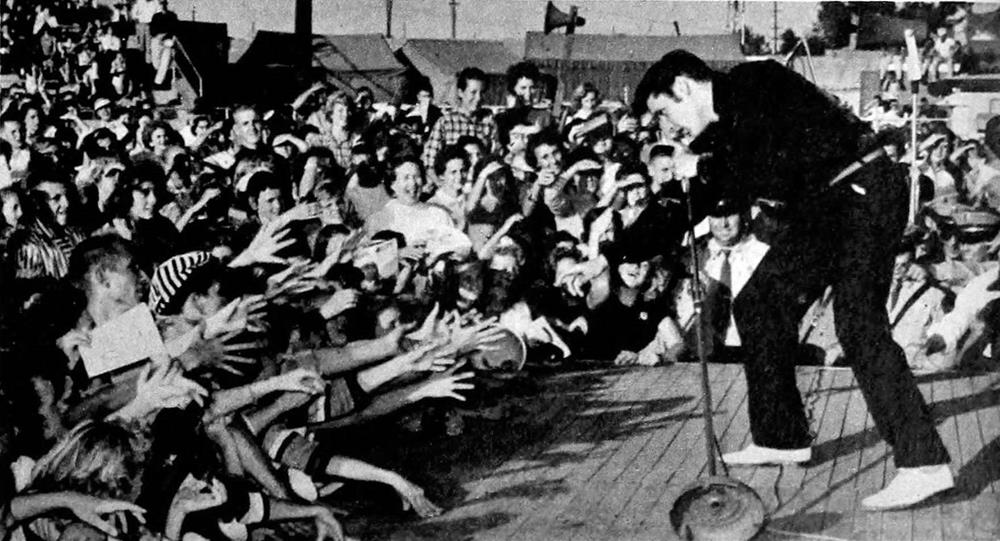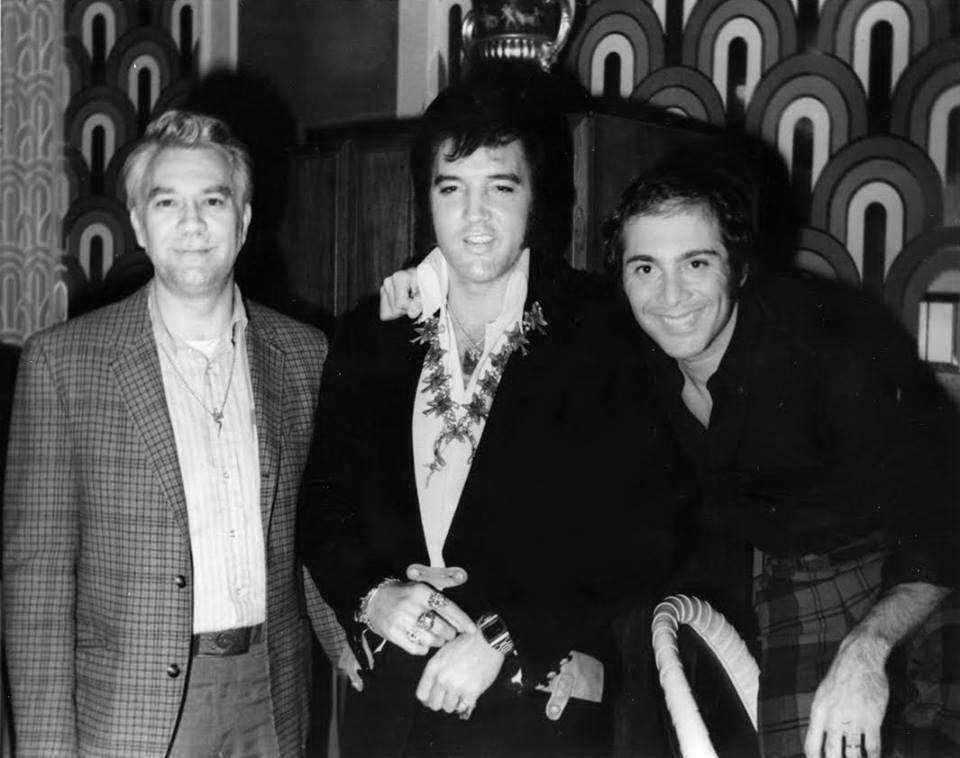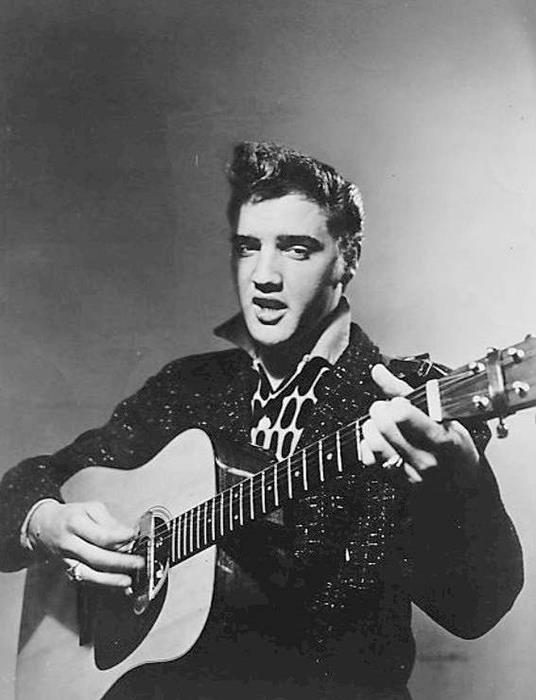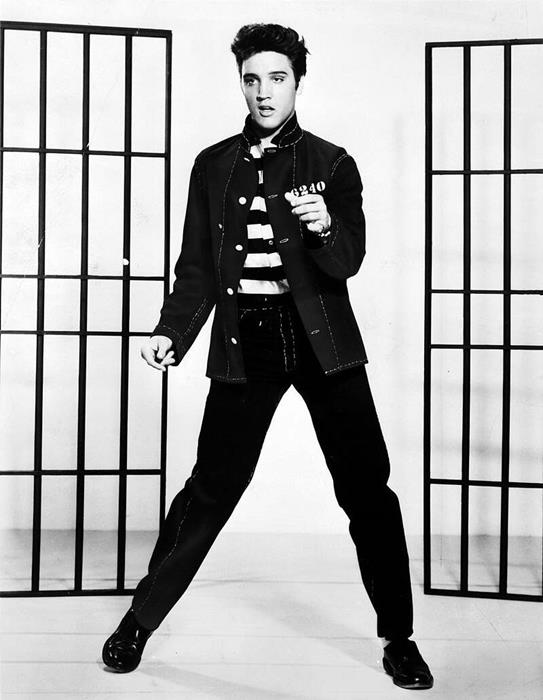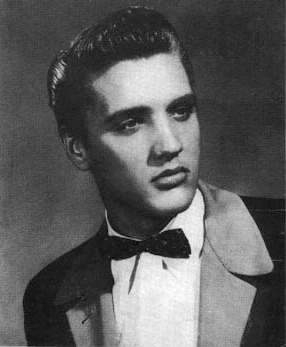Elvis Presley, often called the “King of Rock and Roll,” is one of the most important figures in American music history. His energetic style and unique voice made him famous all over the world. In this article, we’ll explore how Elvis Presley left a lasting mark on American culture. From his music to his style and his influence on other artists, Elvis changed the way people thought about music and celebrity. We’ll look at how his rise to fame shaped the 1950s and 60s and continues to influence us today.
Elvis Presley’s Rise to Fame
Elvis Presley was born in Tupelo, Mississippi, in 1935, and he grew up in a modest setting. His early exposure to gospel music in church, the bluesy rhythms he heard in his neighborhood, and the country music that was popular in the South all influenced his musical style. From a young age, Elvis showed a keen interest in music, and his parents bought him his first guitar when he was just 11 years old.
Breakthrough and Early Success
Elvis’s career took off after he walked into Sun Records in Memphis to record a song as a gift for his mother. Sam Phillips, the owner of Sun Records, saw potential in Elvis’s unique sound, which blended various musical styles. His first big hit, “That’s All Right,” was recorded in 1954, and it was unlike anything people had heard before. This song, coupled with Elvis’s charismatic performances, made him a local star in Memphis.
National Acclaim
Elvis’s fame spread rapidly after he signed with RCA Victor in 1955 and released hits like “Heartbreak Hotel” and “Don’t Be Cruel.” These songs catapulted him to national stardom, and his appearance on television shows like “The Ed Sullivan Show” introduced him to a wider audience. His on-screen charisma and energetic performances, characterized by his distinctive vocal style and provocative dance moves, caused a sensation across the country.
Defining Performances and Songs
- “Jailhouse Rock” and “Hound Dog” became anthems of the era, showcasing his ability to blend rhythm and blues with pop.
- His performance on “The Milton Berle Show” in 1956, where his gyrating hips earned him the nickname “Elvis the Pelvis,” marked a turning point in his career. It sparked controversy and fascination, pushing his fame to even greater heights.
Elvis Presley’s journey from a truck driver in Memphis to a national icon was swift and dramatic. His unique sound and style broke barriers in the music industry and laid the groundwork for a new genre of music, ultimately making him a key figure in the birth of rock and roll.
Musical Influence
Fusion of Musical Styles
Elvis Presley’s music was revolutionary for its time, primarily because it brought together diverse musical influences that had not been combined before. His sound was a dynamic amalgamation of blues, gospel, country, and pop—genres that were, until then, largely enjoyed by separate audiences. This blend not only appealed to a wide range of listeners but also played a crucial role in the racial integration of music styles in the mid-20th century.
The Birth of Rock and Roll
Elvis is often credited with popularizing rock and roll, a genre that changed the music landscape forever. His energetic interpretation of the music, driven by his powerful vocals and emphatic body movements, captured the imagination of the youth of that era. Songs like “Blue Suede Shoes” and “All Shook Up” are perfect examples of how his music mixed rhythm and blues with country to create something entirely new and exciting.
Influence on Other Musicians
The impact of Elvis’s music extended far beyond his own recordings. He influenced countless other artists both during and after his lifetime. The Beatles, for instance, cited Elvis as a major inspiration. John Lennon once said, “Before Elvis, there was nothing.” His style and success opened doors for future generations of musicians who drew from his pioneering approach to create their own styles.
Technological Impact on Music
Elvis also played a significant role in the advancement of music recording and production techniques. Working with RCA Victor, Elvis and his team utilized multi-track recording methods, which were relatively new at the time. This technology allowed them to experiment with different sounds and overdubbing, leading to richer, more vibrant recordings that set a new standard for music production.
Elvis Presley’s musical legacy is characterized by his ability to bridge cultural divides and inspire a sense of freedom and rebellion in his listeners. His contributions to the development of rock and roll not only shaped the genre but also helped define a new cultural era.
Cultural Impact
Through his pioneering music, distinctive style, and cinematic contributions, Elvis Presley profoundly shaped American culture. Below are some of his cultural impacts:
Fashion Icon
Elvis Presley was not just a musical trailblazer; he was also a style icon whose fashion choices had a profound influence on American and global culture. His flamboyant and bold attire, including the famous jumpsuits, gold lamé suits, and leather outfits, became synonymous with rock and roll swagger. Elvis’s unique sense of style, characterized by his pompadour hairstyle and flashy accessories, set new trends and inspired a generation to embrace a more expressive, less conservative fashion sense.
Shaping the 1950s and 60s Youth Culture
Elvis’s emergence coincided with a transformative period in American society where the younger generation was beginning to assert its identity and values. His music and persona resonated deeply with teenagers, providing them with a new form of cultural expression that was distinct from that of their parents. Elvis embodied a spirit of rebellion and freedom, appealing to the desires of young people to break free from the more restrained and conformist societal norms of the time.
Media and Cinema
Elvis’s impact extended into film and television, where his appearances further solidified his status as a cultural icon. He starred in 31 films, and although these movies were often critically panned, they were commercially successful and broadened his appeal across different demographics. His films like “Viva Las Vegas” and “Jailhouse Rock” showcased his talents beyond music, reinforcing his influence in popular culture.
Broadening Cultural Horizons
Elvis also played a significant role in breaking down racial barriers in music. By embracing and popularizing music that had roots in African American communities, such as blues and gospel, he helped bring this music into the mainstream. His success opened doors for other artists of color, contributing to a more integrated music industry. This aspect of his legacy is sometimes viewed with complexity, as it also involves discussions about cultural appropriation.
Legacy in Popular Culture
Decades after his death, Elvis Presley’s influence remains evident in various aspects of popular culture. His music continues to be celebrated, his style imitated, and his life and career are the subject of countless books, documentaries, and films. His Graceland mansion in Memphis is a major tourist attraction, drawing fans from around the world to celebrate his life and legacy.
Role in Social Change
Through his music and persona, Elvis Presley played a nuanced role in social change, impacting not only the entertainment industry but also contributing to the gradual transformation of societal attitudes in mid-20th century America.
Crossing Racial Boundaries
Elvis Presley emerged as a musical icon during a period of intense racial segregation in America. His music, heavily influenced by African American genres such as blues, gospel, and R&B, played a crucial role in bridging racial divides. By bringing traditionally Black music to a predominantly white audience, Elvis challenged the prevailing racial boundaries within the music industry and society at large. His widespread appeal among diverse audiences helped pave the way for greater acceptance and appreciation of African American music and artists.
Controversies and Criticisms
Despite his role in popularizing African American music, Elvis also faced criticism regarding issues of cultural appropriation. Some accused him of benefiting from Black culture without adequately acknowledging its origins or contributing to the communities that created it. This complex aspect of his legacy invites ongoing debate about the dynamics of race, culture, and commercial success in the music industry.
Influence on Social Norms
Elvis’s impact on social change extended beyond race. His provocative performance style and sexualized dance moves challenged the conservative social norms of the 1950s. Elvis’s on-stage gyrations and unabashed expression of sexuality provoked a backlash from conservative circles but also inspired a sense of liberation among the youth. By defying the strict moral codes of the time, he contributed to a broader cultural shift towards greater openness and freedom of expression.
Contribution to the Civil Rights Movement
While Elvis was not an outspoken activist in the civil rights movement, his actions demonstrated a form of passive support for integration. He openly admired and collaborated with Black musicians, and his music helped expose racially segregated audiences to Black musical styles. Moreover, his personal relationships and public statements at times reflected a progressive stance on race relations, though he remained largely non-political in his public life.
Legacy of Social Influence
Elvis’s indirect contributions to social change are a significant part of his legacy. By challenging and changing cultural and musical norms, he helped shape a new social consciousness among Americans. His role in the cultural shifts of his time illustrates how artists can influence society by broadening people’s horizons and challenging established norms.
Legacy and Continuing Influence
Enduring Legacy in Music and Popular Culture
Elvis Presley’s legacy is immense and multifaceted, transcending time and continually influencing various aspects of culture. As a pioneering figure in rock and roll, his music laid the groundwork for the genre’s evolution, influencing the sound and style of countless artists that followed. Even decades after his death, Elvis remains a cultural icon, symbolizing the rebellious spirit and transformative potential of rock music. His songs continue to be covered and sampled, and his image is an enduring symbol of cool for each new generation.
Influence on Modern Artists and Musicians
Numerous contemporary artists cite Elvis as a major influence on their careers. From rock to pop and even hip-hop, elements of Elvis’s style—his vocal prowess, charismatic stage presence, and emotional depth—can be seen in the performances of modern music stars. Artists like Bruce Springsteen, Madonna, and even newer acts like Bruno Mars have acknowledged how Elvis shaped their understanding of music and performance. The ‘Elvis effect’ can also be seen in the continued popularity of his music in movies, television shows, and commercials, underscoring his lasting impact on the entertainment industry.
Reflections in Current American Culture
Elvis’s influence extends beyond music into broader American culture, where his legacy plays a role in shaping attitudes towards fame, success, and the blending of cultural boundaries. His life story, from humble beginnings to superstar status, embodies the American dream and continues to inspire individuals seeking to make their mark in the world.
Elvis broke down the subtle barriers that had long separated Black Americans from white audiences. He openly acknowledged his admiration for and inspiration from several prominent Black artists. He expressed his appreciation for influential musicians like B.B. King, Ivory Joe Hunter, and Fats Domino, highlighting their impact on his music and career.
Furthermore, the fascination with his personal life and career speaks to the celebrity culture that dominates today’s media landscape. Elvis also helped to pave the way for the acceptance and celebration of diverse musical influences within mainstream American music, a trend that continues to define the industry.
Elvis Presley’s legacy is not just a historical footnote but a living, evolving influence that continues to resonate across music genres and cultural boundaries. His groundbreaking work not only shaped the landscape of American music but also continues to influence the artistic expression and cultural identities of modern artists and fans alike.
Conclusion
Elvis Presley’s influence on American culture is profound and enduring. From revolutionizing music with his unique sound to challenging social norms and setting new trends in fashion and media, Elvis left an indelible mark on the world. His legacy continues to inspire new generations of artists and musicians, demonstrating that his impact extends far beyond his time. Elvis was not just a musician; he was a cultural icon whose contributions continue to resonate in every corner of American life.


